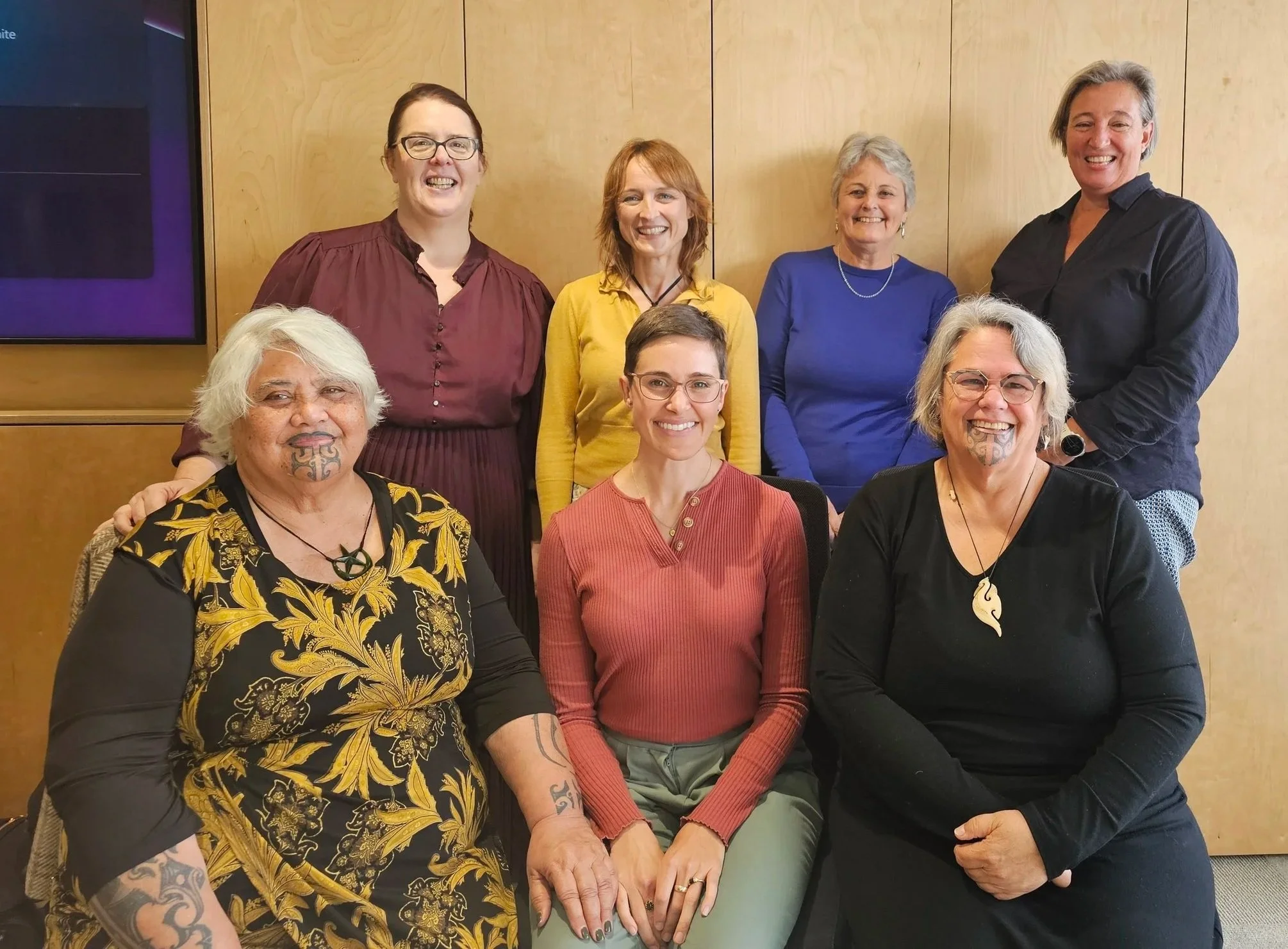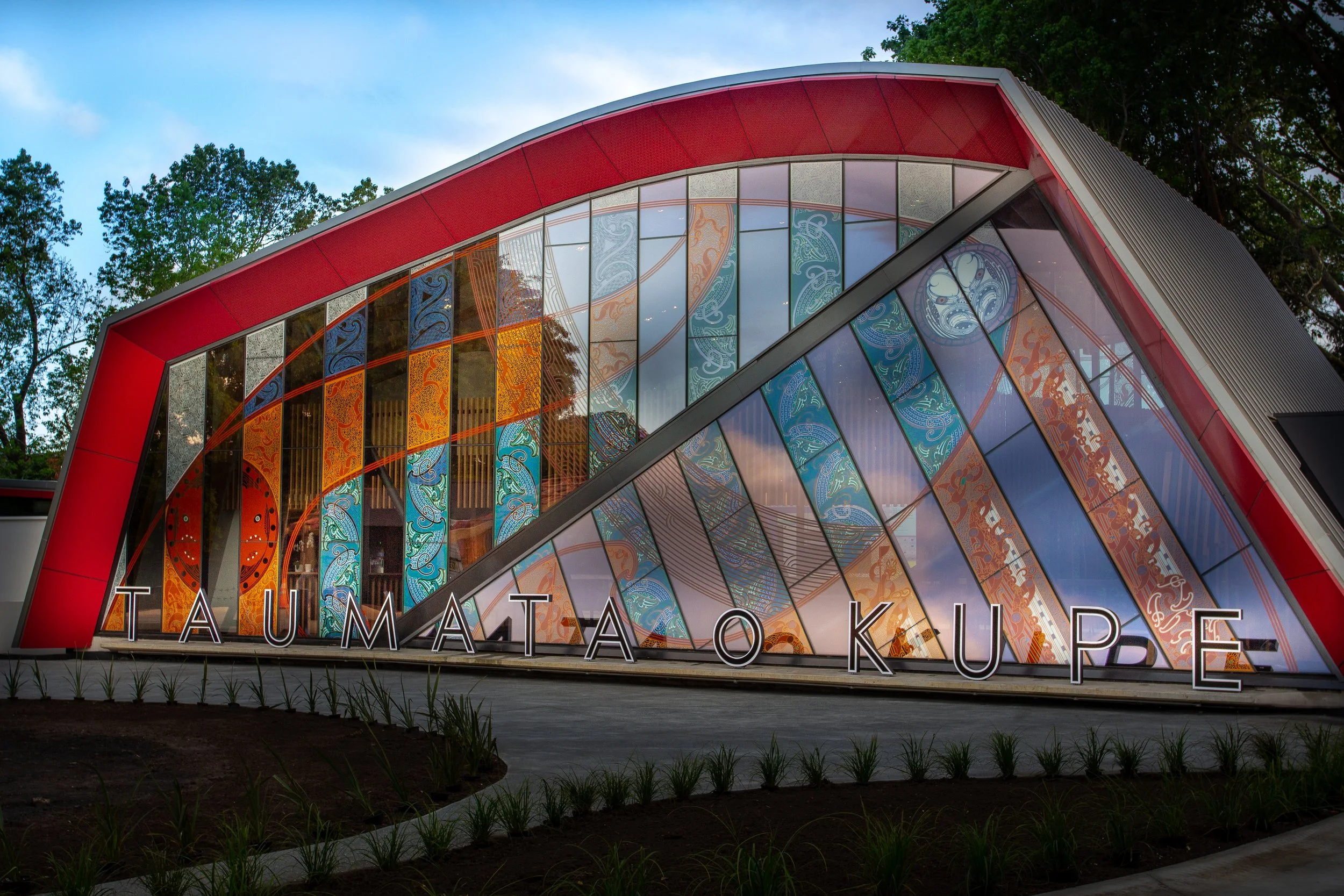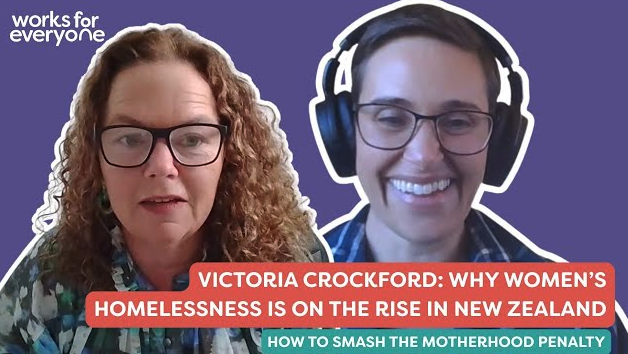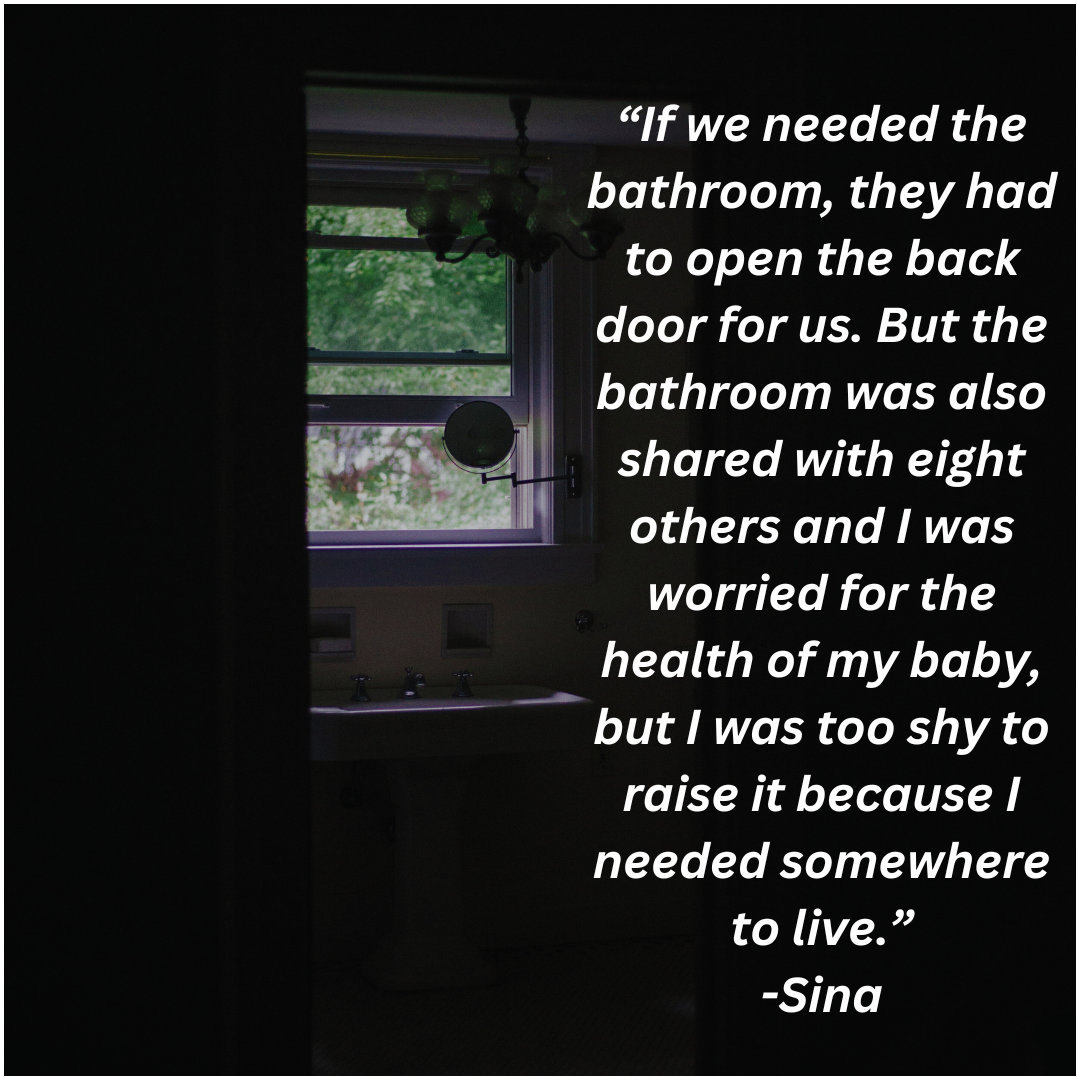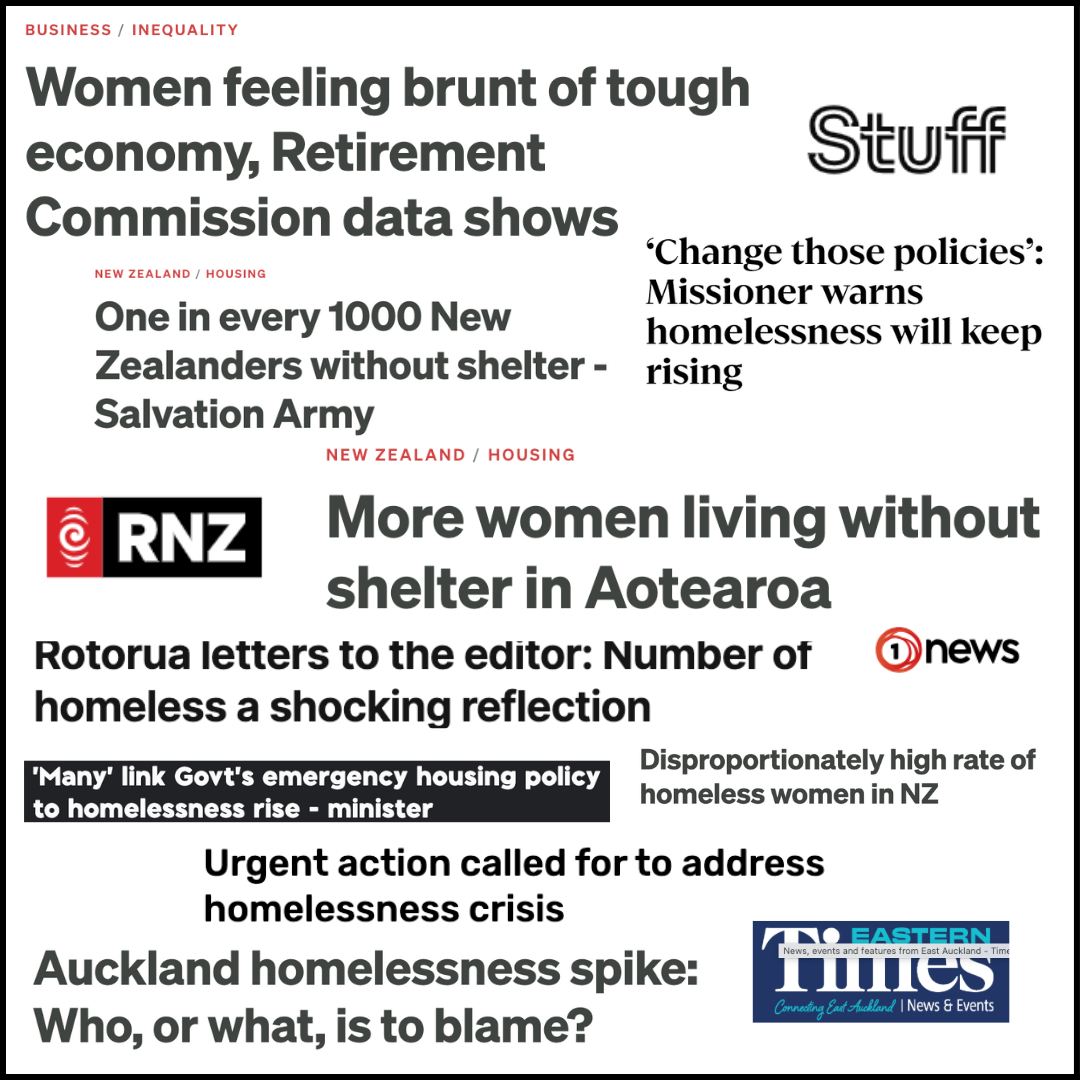September 2025 pānui
It’s wonderful to be together today. The CEWH Steering Committee alongside our team.
Top row (left to right): Helen Robinson, Amanda Kelly, Jill Hawkey, and Jo Cribb.
Bottom row (left to right): Caroline Herewini, Victoria Crockford, and Kathie Irwin.
Ka tangi te wharauroa, ko nga karere a Mahuru
When the shining cuckoo calls it is the messenger of spring
This kōanga | Spring, at the Coalition to End Women’s Homelessness NZ, we are embracing this time of fresh energy.
We want to begin by thanking the women who have bravely shared their lived experiences in stories you can read further in this newsletter. Their stories illuminate the realities of homelessness and guide our collective action.
At the heart of our work is the recognition that wāhine are central to the wellbeing of whānau, hapū, and communities. Their strength, care, and leadership ripple outwards, shaping generations. This is captured beautifully in this whakataukī:
Ko te wahine te kaitiaki o te whare tangata
Women are the guardians of the house of humanity
Alongside our new Kaihautū Dr. Kathie Irwin and Collection Impact Lead Amanda Kelly, we are growing connections and widening our net across the sector. This season, we look forward to building momentum and starting new ventures.
As part of this work, soon we will be announcing a series of lunchtime webinars, designed to deliver quick, accessible learning opportunities for busy kaimahi, practitioners, and leaders working to respond to and prevent women’s homelessness. The series will focus on amplifying voices, research and evidence, and policy and practice.
Guided by Te Tiriti o Waitangi, CEWH is committed to ensuring that at least half of these sessions are Māori-led, reflecting the over-representation of wāhine Māori in homelessness data. These webinars will be designed and delivered by Māori practitioners, researchers, and leaders - ensuring kaupapa Māori solutions are at the forefront of our collective learning. More about the first webinar is below.
This kōanga, we’re also excited to share a sneak peek of the Papatūānuku Paradigm, a new Gender Analysis with a Te Ao Māori Lens toolkit developed by Dr. Kathie Irwin.
Today, our Steering Committee members Victoria Crockford, Jill Hawkey, Caroline Herewini, Helen Robinson, and Jo Cribb came together, joined by Kathie Iwrin and Amanda Kelly, for a strategy day to align on priorities and plan the next phase of our work.
May you all enjoy light spring showers, known as ‘ua kōwhai’ or kōwhai showers, heralding the September bloom of yellow flowers on the kōwhai tree - a gentle reminder that growth, resilience, and new beginnings are possible.
Nāku noa,
Victoria Crockford and Kathie Irwin,
Project Director and Kaihautū, Coalition to End Women’s Homelessness
NEWS AND VIEWS
Introducing the Papatūānuku Paradigm
Earlier this year, we began collaborating with Kathie Irwin and Associates to develop our Gender Analysis with a Te Ao Māori Lens toolkit. We’re thrilled that Kathie has since joined CEWH as our Kaihautū, bringing her mana, wisdom, and vision to this important mahi.
The resulting tool, the Papatūānuku Paradigm, is designed to strengthen the work of CEWH and others in the sector; helping address the complex issue of women’s homelessness.
In July, we held two wānanga to explore and test the framework – one at Auckland City Mission – Te Tāpui Atawhai, and another at Te Whare Tiaki Wāhine in Porirua. Participants shared deep kōrero, insights, and aroha, exploring how the tool can guide culturally sensitive, practical responses that empower wāhine.
The Papatūānuku Paradigm includes research analysis, conceptual frameworks grounded in lived experience, and practical guidance for policy and practice. It emphasises the Orokohanga to Aotearoatanga horizon, Te Tiriti o Waitangi, and the role of the Machinery of Government in shaping women’s lives.
We’re excited for the next design phase and look forward to sharing The Papatūānuku Paradigm more widely.
For a deeper dive into Kathie’s mahi and wānanga insights, read more on our blog here.
Lunchtime learning: Explore the Papatūānuku Paradigm with Dr Kathie Irwin
In the first of our lunchtime learning series, Join Kathie as she shares the preliminary version of the Papatūānuku Paradigm for sector feedback.
Kathie will be seeking practitioners’ reflections on how the tool resonates in practice, and the ways it could be most useful. Attendees will receive the preliminary version in advance of the webinar, with an invitation to explore its application and share perspectives.
Save the date: Wednesday 8 October, 12–1pm
More details to come: Watch out for an email next week, and follow us on LinkedIn for updates.
Building homes, honouring whānau and Kaumātua
This month, we acknowledge three remarkable housing milestones across Aotearoa that honour whānau, kaumātua, and ancestral connections.
In Waitara, Ngāti Rāhiri’s newest kaumātua units, Te Pae Kura, were blessed and opened, creating a place where “knowledge, love, and the mana of our elders are laid before us” and where the dignity of kaumātua guides the community forward.
In Napier, Mana Ahuriri Trust conducted a whakahaumaru karakia for their first housing development Pukemokimoki on Owen Street, as part of their Accelerated Housing Programme. This project marks the start of a vision to deliver safe, warm homes for whānau, on land that carries the spiritual essence of Pukemokimoki.
At Waiohiki Marae, Ka Uruora was launched, offering pathways to home ownership through financial education, housing solutions, and navigational support. The programme aims to secure warm, dry homes for whānau.
These initiatives showcase the connection between housing, whānau wellbeing, and the continuation of cultural heritage, creating spaces that nurture both community and future generations.
Te Matapihi National Māori Housing Sector Hui
Amanda Kelly, our Collective Impact Lead, had the privilege of attending the Te Matapihi National Māori Housing Sector Hui at Te Mahurehure Marae in Auckland. The hui brought together a wide range of voices to kōrero on key topics including homelessness, papakāinga development, and future funding pathways.
Highlights included kōrero around:
Homelessness: Jordan Robertson (Te Taumata o Ngāti Whakaue) shared insights from He Ara Hiki Mauri, a Tangata Whenua-led response. There was strong recognition of collective action, including the Māori Housing collective Arohanui Ki Te Tangata, and calls for greater alignment between Whānau Ora and Housing.
Papakāinga development: Steve Kerr (Te Puni Kōkiri) discussed support for small-scale developments on whenua Māori and highlighted current challenges under the RMA, particularly in flood zones, as well as opportunities to reduce financial burdens through local authority engagement.
Future Funding: Jessica Smith (DCE, Ministry of Housing and Urban Development) outlined consultation on the updated GPS-HUD 2025 and MAIHI integration, new flexible funding for 600–900 social homes from 2027, and work to identify Māori policy priorities.
Innovation: Te Matapihi launched Te Matapihi Ki Te Ao, an online Innovation Activator using AI and technology to support community housing applications and streamline key processes.
Amanda expressed her gratitude for the kōrero, and we extend our thanks to the hosts for facilitating such a meaningful and collaborative gathering.
Te Māhurehure Marae
CWLANZ champions action for women’s homelessness
At their National Conference in July, the Catholic Women’s League Aotearoa New Zealand (CWLANZ) passed a remit calling for urgent action on women’s homelessness. We warmly acknowledge their endorsement of the work of the Coalition to End Women’s Homelessness and their proactive advocacy to the Government on our behalf.
Letters have been sent to the Minister of Housing, Hon. Chris Bishop, and the Associate Minister for Social Housing, Hon. Tama Potaka, urging the implementation of the five recommendations CEWH presented in our research Ngā Ara ki te Kāinga. This strong support reflects the growing collective commitment across Aotearoa to create meaningful, systemic change for women experiencing homelessness.
CEWH Kaihautū Dr. Kathie Iwrin makes oral submission to People’s Select Committee on pay equity
Kathie, an expert advocate on women’s economic justice, recently presented an oral submission to the People’s Select Committee on Pay Equity. Sitting “in the healing energy of my tīpuna,” she delivered a structured 15-minute kōrero grounded in Sir Hirini Moko Mead’s Māori mediation model, take-utu-ea (Moko-Mead, Tikanga Māori, 2016).
Kathie focused on three key themes:
Take – The Issue: “The state designed the systems that created pay inequity. The MOG (Machinery of Government) used policy, legislation and regulation to implement the design. There was little chance of individuals escaping the system level impact.”
Utu – Response: Kathie reflected on the significance of the People’s Select Committee as a corrective measure: “The creation of the People's Select Committee, to correct this, is a magnificent mana wahine / feminist intervention. Correcting the system imbalance, outside the system, and shining the light on the ongoing role that the State plays in contributing to pay inequity.”
Ea – Redress: Kathie emphasised long-term solutions for wāhine Māori: “My main call to action is this: direct funding to iwi. If Aotearoatanga, nation building, is so difficult through the Machinery of Government, fund the Machinery of Iwi directly to create the equitable public policy outcomes for whānau, hapū and iwi so urgently needed.”
Kathie’s submission highlighted both the structural causes of pay inequity and practical pathways to redress, centering the experiences of wāhine Māori in the national conversation on fair pay.
CEWH on the Motherhood Penalty podcast
CEWH Project Director, Victoria Crockford, joined Emma McLean on the How to Smash the Motherhood Penalty podcast to discuss the often-hidden reality of women’s homelessness in Aotearoa.
Victoria and Emma explored the human stories behind the statistics, highlighting how women’s homelessness is closely tied to the motherhood penalty and broader systemic barriers. They also discussed the urgent need for change, and what Victoria would do if she had a magic wand to fix it.
Watch and listen to the podcast here
ACC ruling expands compensation for abuse survivors
A landmark 2023 Court of Appeal ruling (TN vs ACC) has potentially widened eligibility for compensation for survivors of childhood sexual abuse. The change could affect up to 100,000 people, with ACC estimating a potential $3.6 billion cost. From 29 September, ACC will fully implement the ruling, which allows survivors to claim weekly Loss of Potential Earnings (LOPE) payments based on the date of the abuse, not when treatment was first sought.
This ruling ties directly into the broader context of women’s homelessness in several ways:
Link between sexual abuse and homelessness:
CEWH research shows a strong correlation between experiences of sexual or domestic abuse and later housing insecurity. Survivors often face long-term mental health challenges, economic instability, and barriers to safe housing.
The recent report Barriers to Exit: How financial barriers prevent women from leaving abusive relationships by Good Shepherd found that the up-front cost of leaving an abusive relationship comes to nearly $10,000.
The ACC ruling highlights how childhood sexual abuse can lead to enduring mental injury, affecting employment and income. As in Hannah’s story from Mildred Armah’s series for Stuff (below), trauma can make it harder for women to maintain stable housing, pushing some into transitional housing or homelessness.
Barriers to accessing support:
ACC’s cautious, phased approach to notifying eligible abuse survivors about compensation mirrors the systemic barriers women face when trying to access housing support. Many women are left without timely assistance, exacerbating instability and retraumatisation.
CEWH research underscores that women need low-barrier, trauma-informed services that recognise the link between past abuse and their current housing need.
Economic repercussions:
ACC’s LOPE payments are intended to compensate survivors for lost earning potential due to abuse. Delays or under-notification of eligible recipients can deepen financial insecurity, increasing the risk of homelessness.
This connects with the experiences of women like Hannah, whose careers were interrupted by PTSD, leaving them reliant on transitional housing.
The ACC TN ruling underscores the long-term social and economic consequences of sexual abuse, aligning with CEWH research showing that abuse survivors are at heightened risk of housing instability and homelessness. It reinforces the need for trauma-informed, gender-responsive services and permanent housing solutions for women and children.
Stuff’s Mildred Armah amplifies voices from the frontline of women’s homelessness in New Zealand
In a recent three-part series by Mildred Armah for Stuff, the lived experiences of women without safe homes reveal resilience and the urgent gaps in support.
One article features 23 year old *Sina, whose baby spent the first five months of life in a cold, unlined garage with her.
“There were some windows but they couldn't open, there were no handles. So if I needed some air for my baby, I just opened the door at night-time. There was no door, at first, but then my brother built one,” Sina said.
Sina is now on the social housing register and hopes she’ll be able to find an affordable home, but staff members say she could be waiting a while.
“Last year, we had over 25 babies born while their parents were in our transitional housing – that’s over 25 babies born into homelessness,” said one kaimahi.
Auckland woman *Talia is preparing for birth while living in transitional housing, and is facing the possibility of giving birth without long-term or permanent housing.
“Sometimes I cry, you know, during the night-time. I just sit up, and there’s tears running down my cheeks, thinking, what am I gonna do if baby's here and we don't have anything prepared?” Talia said.
In Aotearoa, women make up just over 50% of the severely housing-deprived population - well above the OECD average - and are often invisible, relying on couch surfing, overcrowded homes, or unsafe spaces.
Auckland City Missioner and CEWH Steering Committee member Helen Robinson, emphasises the need for a gender-responsive approach:
“At a core level, transitional housing is not permanent housing… What you want for any mother and any child is a permanent home,” Helen said.
Hannah, another featured voice, shares how a history of sexual assault and trauma led to PTSD and difficulties in securing housing, illustrating the link between violence against women and homelessness.
CEWH research confirms that women experiencing domestic or sexual violence are significantly more likely to face housing insecurity, with compounded impacts on mental health and economic stability.
These stories remind us that homelessness is not just about housing - it’s about the cumulative effects of trauma, poverty, and systemic barriers.
Read the articles here:
News and voices that matter
Hundreds of otherwise homeless turning to unsafe boarding houses, social services warn, RNZ
RNZ recently reported on the dangerous and unregulated state of many Auckland boarding houses, which are increasingly being used by people who would otherwise be homeless.
Rangi Andrews from Kāhui Tū Kaha described the realities inside, noting that more than half of the 120 boarding houses their team entered had shared bathrooms and kitchens.
“We're looking at women coming out of family harm incidents who are sharing common spaces with those who are exiting our remand prisons or gang members, ” Rangi said.
Auckland City Missioner and CEWH Steering Committee member Helen Robinson also raised serious concerns, saying that some people, especially women, choose to sleep rough rather than face the risks of boarding houses.
One wahine’s mission to uplift the homelessness crisis in Ōtautahi, Te Ao Māori News
Florence Waaka (Te Arawa, Ngāi Tahu) is continuing to give fresh hope for Christchurch’s unhoused whānau. For nearly 11 years, she has been feeding and supporting people living rough, building trust, and fostering community where it’s most needed, through her grassroots kaupapa, Feed a Bro.
This article includes the story of 65-year-old Ngawai Timu who spent years sleeping rough in Christchurch’s red zone. Living alongside others in their 40s, 50s, and 60s, many delayed housing to prioritise children on the street:
“There were three-year-old twins, an eight-year-old, a ten-year-old. So, some of us said no to houses. We said, ‘Take the kids first.’ That was more important,” Ngawai said.
Now in temporary accommodation with support from Ka Puta Ka Ora Emerge Aotearoa, Ngawai reflects on the adjustment:
“It’s beautiful. But that first night, I slept on the couch in the lounge. I didn’t know how to be inside. I was sweating, in and out of the shower. I’m traumatised. I’ve been living outside too long. It’s going to take time.”
9yo among homeless youth seeking help as the streets claim two of their own
This recent Stuff story highlights the experiences of young people experiencing homelessness in Auckland. In the article, Kiki, 20, recalls the fear she had when sleeping on the streets as a 14-year-old:
“You got a bunch of adults around you and they're very scary looking and some people will pick on the little ones, and that's very scary too… no one should have to look after any young ones, they should not be out on the streets, they should be at home,” she said.
More in the news
Young homeless people 'being denied emergency accommodation', NZ Herald
‘A human tragedy’: Homeless issue stalks Auckland candidate debates, The Post
Emergency housing grants plummet, more homeless turned away under new hard line policy, NZ Herald
NZ’s fall from admired housing provider to a crisis of homelessness, The Press
Homelessness: Still a need to help those who can’t help themselves – Editorial, NZ Herald
Newtown homeless woes: 'We need some assistance if we are going to help them', RNZ
Ministers urged to visit troubled Wellington suburb of Newtown, RNZ
Why homelessness is worse under this government: a story in 10 graphs, The Spinoff
Youth homelessness on the rise, report calls for urgent government action, Te Ao Māori News
POLICY AND POLITICAL INSIGHTS
The draft Government Policy Statement on Housing and Urban Development is open for submissions until 21 September
At CEWH, we’re reviewing the document through a gendered lens and using our Papatūānuku Paradigm toolkit to shape our response.
We are standing firm on Papatūānuku as we feed back.
Ūkaipōtanga, Whakapapa, Aotearoatanga!
If you have knowledge or experience to share on how housing and urban development can better serve our communities, we encourage you to make a submission too.
Safe, secure homes are not just a basic need - they’re a human right and the foundation for wellbeing.
Every voice counts. Have your say here.
He iti te mokoroa, nāna i kati te kahikatea
The grub may be small, but it cuts through the kahikatea
Vic, Kathie, Amanda, Helen, Jo, Caroline, and Jill

